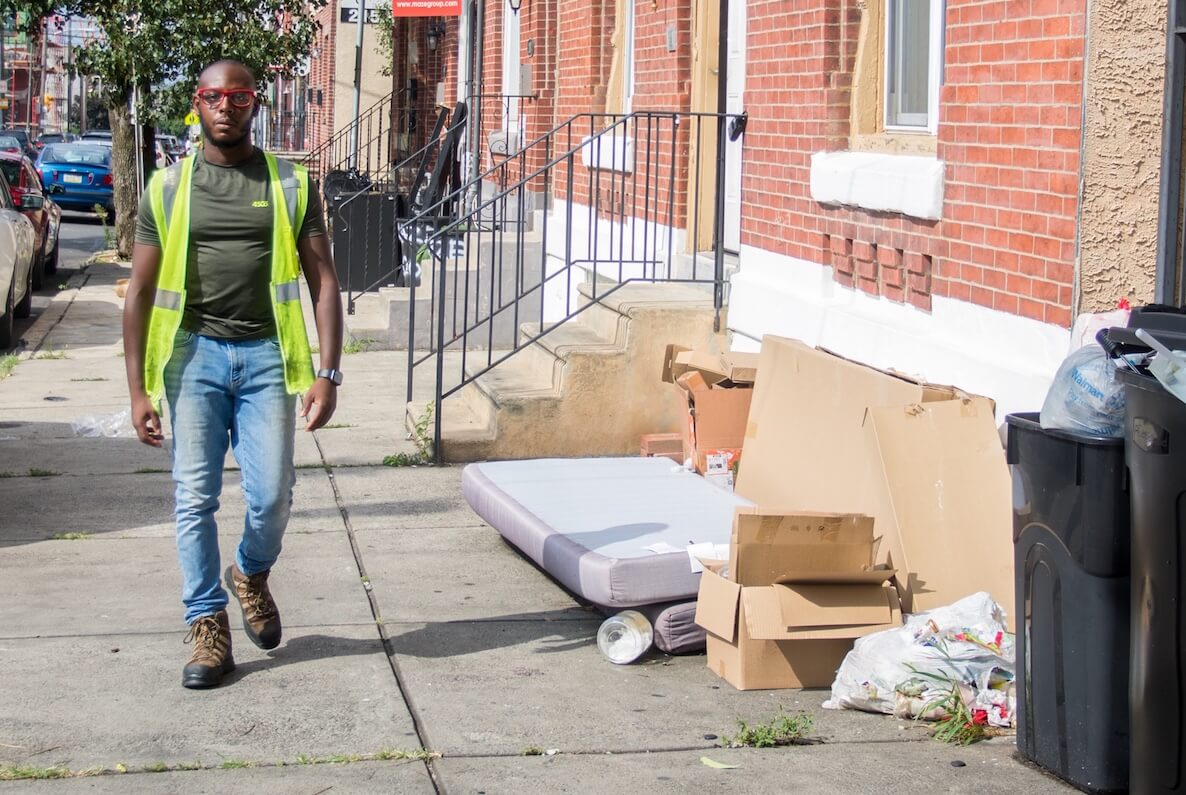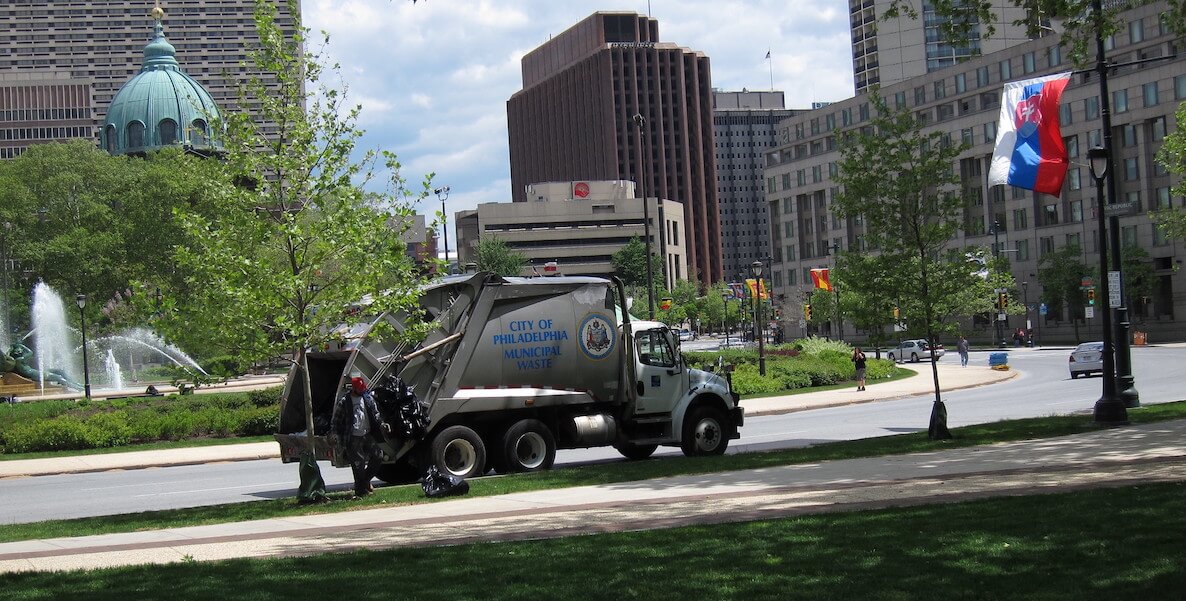Controller Rebecca Rhynhart this week released a new analysis of the city’s trash collection performance over the last decade, which confirms what everybody’s been seeing on the ground: on-time trash collection has gotten a lot worse since the pandemic started.
The analysis is still an interesting read, because it shows the effects haven’t been equally distributed, and some parts of the city are seeing substantially worse performance than others. They also contribute a novel new angle to the issue, which is the trash tonnage generated in each sanitation district. With many more people now working from home since the pandemic started, there’s been a big increase in the amount of household trash, and that increase has also been unevenly distributed.
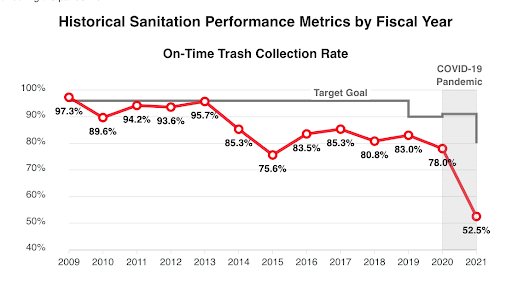
This is a good way to think about the problem, because the point really isn’t about blaming sanitation workers—who clearly have one of the hardest jobs in the city—there’s genuinely been a shock to the system with lots of extra household refuse for the city to process. Looking at the relationship between the trash tonnage increase, and the areas that have increased delays, can help Streets Department managers better target solutions.
Where the Streets Department does come in for some blame, however, is that the analysis shows on-time trash collection performance was declining every year even before the pandemic, so while the Covid-19 situation certainly made things a lot worse, this was already an area of city services that needed some better management, as former Zero Waste czar Nic Esposito has pointed out.
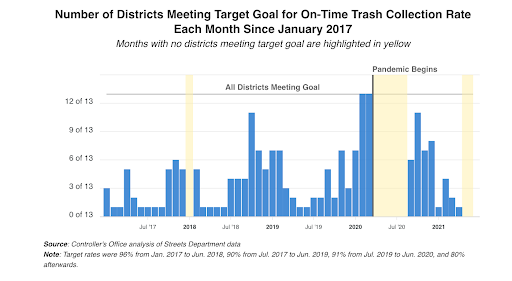
Here’s the Controller Rhynhart’s summary of the key findings:
-
-
- On-time collection has declined each calendar year since 2017, with the largest decreases in 2020 and 2021 during the pandemic.
- Trash tonnage has increased in nearly all districts since the pandemic began, although the size of the increase varies from district to district. For example, district 6L in the lower Northeast had the highest tonnage total prior to the pandemic and one of the largest increases during the pandemic. On the other hand, areas like district 2B in Center City have had only a marginal increase in tonnage.
- Some areas of the city have consistently better on-time rates, while others have consistently worse. For example, Center City (district 2B) is among the top performers in terms of on-time rate each month, while districts such as 4G in Northwest Philadelphia and 2D in South Philadelphia have collection rates consistently worse than the citywide average.
- Since 2017, district 2D’s (South Philadelphia) on-time collection rate is worse than the citywide average despite having one of the lowest tonnage totals in the city. Similarly, district 4G (Northwest Philadelphia) has one of the lowest on-time rates in the city despite tonnage levels similar to the citywide average.
- Districts 2B (Center City) and 3F (Northern Liberties/Fishtown/Kensington) have lower-than-average tonnage totals and among the highest on-time rates in the city since the pandemic.
- The pandemic worsened pre-existing trends around on-time collection rates, with the gap between the worst-performing and best-performing districts widening. In 2017, the district with the best average rate (6A) was 31 percentage points better than the district with the lowest rate (4G). In the first half of 2021, that gap widened to 45 percentage points, with district 6L having an on-time rate of 30% and district 3F having a rate of 75%.
- On-time collection has declined each calendar year since 2017, with the largest decreases in 2020 and 2021 during the pandemic.
-
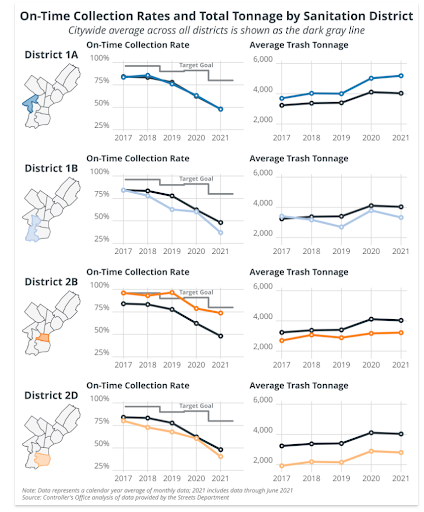
Check out the full report for some more interesting details, and the on-time performance and tonnage breakdowns for your area of Philadelphia.

Jon Geeting is the director of engagement at Philadelphia 3.0, a political action committee that supports efforts to reform and modernize City Hall. This is part of a series of articles running on both The Citizen and 3.0’s blog.

MORE ON OUR TRASH PROBLEMS
Photo by sameold2010 / Flickr


